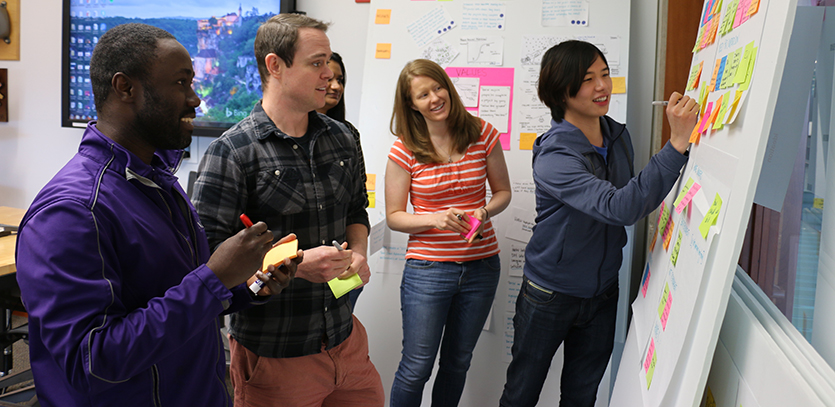MMM Team Brings Special Forces to Code Platoon
Students apply design innovation during Business Innovation Lab
A team of MMM students that included military personnel were asked to identify the best channels to raise awareness about Code Platoon, a Chicago vocational school that trains veterans through an intensive coding program.
The five-person team's work stems from Design 480: Business Innovation Lab, a unique experiential course in which MMM students utilize empathy and design thinking to solve a client partner's real-world business problems.
Their challenge: attract more veterans to the 14-week coding program, which can lead to high-paying, high-demand software development internships and jobs, and improve its enrolled students' experience.
To gain a holistic look at Code Platoon from the initial awareness of the nonprofit school to the application process and through the accepted student experience, the team interviewed Code Platoon students.
“With two members of the team being part of the service, I believe they had more genuine interviews. There was already that connection,” says Rodrigo Levy, project champion and Code Platoon executive director.
With two military personnel — David Huffman, an active duty Army captain, and Jill Seidel, a veteran Army captain — the team offered special insight that led to innovative solutions.
"They found several pain points that needed changing beyond the initial requests. One was that we needed to communicate more clearly and directly what the process is during the three-step application," Levy says.
"That's what a good consultant does," says Amy Schwartz, MMM team's faculty adviser. "You don’t blindly take the client’s brief."
The team found that many vets struggled with the application process, which includes taking 40 to 60 hours of free online coding courses before being accepted into the program.
"We were losing 80% of our applicants at that point," Levy adds. "They found we were losing people because they were stuck on a tutorial and had no one to talk them through it."
Suggestions included having more contact with applicants throughout the process, maintaining clear and consistent messaging and changing the website for a clearer understanding of the application process.
During conversations and surveys with prospects, current students and alumni, the team heard one word repeated — trust. "Many vets can be suspicious of those claiming to help. There have been a lot of people who have made promises that are not kept," Huffman says. "They need to be sure they could trust Code Platoon."
"I’ve retooled the application process and implemented about 80% of their suggestions at this point," Levy says. "I plan on using all of their suggestions."

